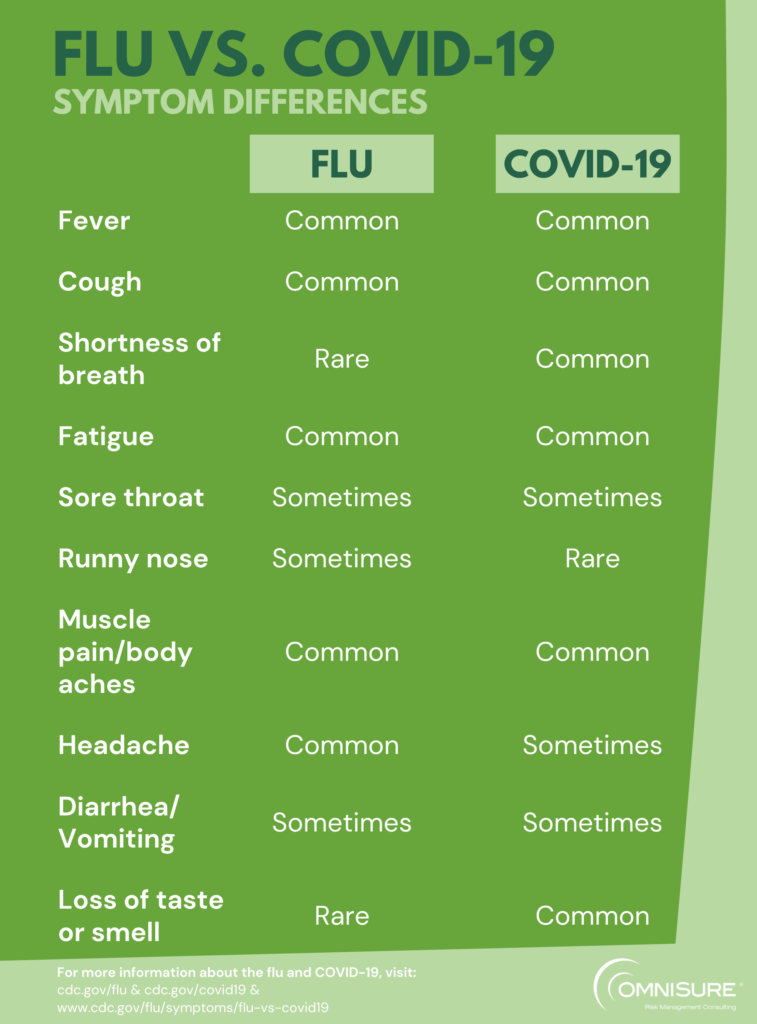Healthcare workers are at risk for exposure to diseases of all kinds, and because they work with patients and handle materials that can spread infections, it is important to get appropriate vaccines to reduce the risk of spreading vaccine-preventable diseases.
This flu season, the CDC is recommending that all healthcare workers get a flu vaccine because both flu viruses and the virus that causes COVID-19 will be spreading during the fall and winter. Encouraging all people to get vaccinated will reduce respiratory illness-related medical visits and a result, the strain on the healthcare system. In this chart, you can learn more about the differences between the flu and COVID-19.
Carol Marshall, an OmniSure consultant, pointed out that flu vaccinations in the healthcare world are fairly commonplace. Mandatory flu vaccination policies differ from state to state and many leave it up to local health departments or hospitals, but it is common for nursing homes to require the flu vaccine. In a situation where an individual is unable to or refuses to be vaccinated, most nursing homes and hospitals require constant use of personal protective equipment while on shift. As a result of the current COVID-19 outbreak, constant use of PPE is already standard practice, which will hopefully reduce the spread of flu in healthcare facilities.
Requirements for COVID testing for healthcare workers who have been exposed to the virus or are symptomatic have been issued federally by Health and Human Services, and some states mandate regular submission of proof of testing. If some healthcare workers refuse to be tested, that is within their rights, and OmniSure recommends creating a policy to handle those difficult situations. If you are looking to make a plan for your facility, the OmniSure team is ready to help you through the process and answer any questions you may have.
This flu season, testing for both COVID-19 and the flu is vital because symptoms for both viruses are quite similar. OmniSure encourages clients to start ordering new testing equipment which can discern between the flu and COVID-19 early, to make sure they have supplies on hand.
Some medical malpractice insurance professionals are speculating about potential malpractice claims due to wrong diagnoses, delay in treatment, or possibility of COVID-19 or the flu symptoms masking or causing other illnesses.
On a hopeful note, there are some who think that the flu will be less of a threat this year than in previous years due to widespread preventative measures taken in healthcare environments and in public, including distancing and higher use of PPE. Marshall mentioned how many flu outbreaks start in schools, and because children are wearing masks in schools, it is possible that this risk will go down significantly.
OmniSure asserts, however, that flu vaccinations for staff and patients are just as important as in previous years to decrease the risk of contracting the flu and spreading it. In the instance of a healthcare worker declining a flu vaccination or being unable to be vaccinated, OmniSure encourages employers to follow predetermined protocols: mandatory PPE and regularly checking for symptoms. So far, worldwide the flu hasn’t spiked this year, but we will be monitoring the situation to best advise our clients. If you’re struggling with a specific scenario and are concerned about the risks involved, we encourage you to start a conversation with your consultant, and if you aren’t already working with OmniSure, we’d love to be a part of your risk management team.




